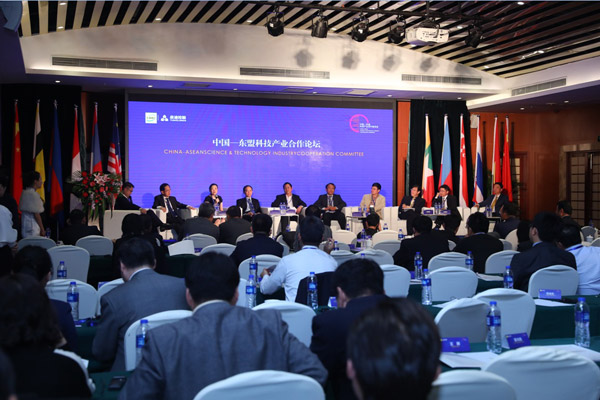Key body is turning point in China, ASEAN relations, officials say
A key turning point to China's relations with ASEAN member states was achieved in the wake of the inauguration of a key committee, senior officials said.
|
China-ASEAN Science and Technology Industry Cooperation Committee was inaugurated during the China-ASEAN Science and Technology Industry and Business Cooperation Forum on Oct. 26 in Beijing. [Photo/China Daily] |
China-ASEAN Science and Technology Industry Cooperation Committee was inaugurated during the China-ASEAN Science and Technology Industry and Business Cooperation Forum on Oct. 26 in Beijing -- an event marking the 15th anniversary of China-ASEAN's strategic partnership.
The committee will be located in Tus industrial park in Nanning, capital of Guangxi Zhuang autonomous region.
Guangxi Tus Holding is the former Tsinghua University Science Park Development Center, also known as Tus Park, which was founded in 1994. It is a large integrated company established by Tsinghua University.
In line with the Belt and Road Initiative, Guangxi Tus-Holdings will help shoulder the responsibility to power the transformation and upgrading of technology industry, promoting innovation and economic development in China and ASEAN.
It is one of the first National Demonstration Enterprises in the services industry and the company says it actively responds to the national strategy of innovation-driven development.
During the forum, it was agreed that the establishment of the science and technology committee would help strengthen science and technology exchanges and relations between China and ASEAN members, bringing new opportunities for science and technology companies on both sides.
Science and technology exchange and innovation has become a new driving force for developing relations between China and ASEAN, and the committee's officials say establishing a stable platform to have science and technology cooperation will greatly help to promote the economic growth.
The forum attracted many technology industry and technology groups, well-known universities, research industries, business leaders and other representatives from China and the ASEAN.
They all came to witness the establishment of the committee, and discussed further development of the science and technology industry and the economy.
Xu Ningning, executive director of the China-ASEAN Business Committee and executive director of the China-ASEAN Business Council, said that China and ASEAN will take the 15th anniversary as a turning point to establish the working relations in various areas, entering a new stage of cooperation and development.
By establishing and strengthening cooperation on science and technology industry and business, the two sides will further stimulate the vitality of economic development, making that development more sustainable, official said.
It is also an important measure in line with the Belt and Road Initiative, Xu said.
The China-ASEAN Business Committee CABC recommended that Wang Jiwu, chairman of Tus-Holdings, be chairman of the China-ASEAN Science and technology Industry Cooperation Committee.
Xu said they believed that Tus-Holdings would play a positive role in the cooperation.
Wang said that Tus-Holdings has already established technology innovation projects in 45 countries, actively responding to the Belt and Road Initiative.
He added that some of the projects have already reached a key stage in their development and have established links to a number of regions, universities and many companies in various fields.
Li Dongming, executive director of the China-ASEAN Business Committee and chairman of Guangxi Tus-Holdings Co introduced its development plan.
Initially the committee will recommend cooperation projects between China-ASEAN governments, research institutes and industry associations and companies.
In addition, it plans to promote exchanges and training in universities, scientific research institutions in China and ASEAN nations, by hosting exchange forums and technology innovation conferences, further boosting mutual development.
